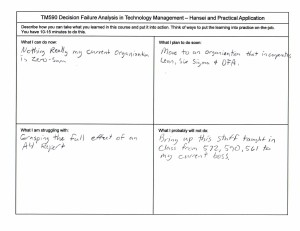Accreditation is supposed to result in graduates who can write and think well. Huh! Who knew? Finally, an article that explains what faculty and administrators have been missing all these years (“Pressure on Accreditation Is Cause for Concern, Speaker Warns,” CHE, 7 January 2014, subscription required).
All along we thought that the purpose of accreditation was to determine if a university was in conformance with requirements (both accreditors’ and self). The confusion gets worse because accreditors view their role as “quality improvement,” while the federal government wants accreditors to fulfill a “quality assurance” role. The latter already happens now (though poorly for some things), while the former is, in my experience, non-existent.
One degree program that I teach in has these four learning outcomes:
- Demonstrate the knowledge required to select the techniques, skills, and modern tools to manage the life cycle of a product or service.
- Show knowledge of the management of operations, including facility requirements and resource planning.
-
Display the knowledge vital to create a “Lean” working environment.
-
Exhibit the knowledge required to be an innovative leader and manage a diverse workforce, facilities, and lead project and problem solving teams.
It doesn’t say anything about teaching students how to write and think well. Airball!
All I can say is that it’s a good thing that we do not have these as our learning outcomes, because we would never obtain accreditation:
- Student knows to look at the syllabus when they have a question about the course
- Arrives to class on-time
- Does not leave class early
- Attends every class
- Does all assignments
- Follows assignment instructions
- Submits assignments on-time
But seriously, the “graduates who can write and think well” problem is widely distributed among teachers at all education levels, not borne solely by college and university teachers. Accreditors own a piece of it, higher ed administrators do as well, so do elected officials, students, parents, employers, and so on. It is stupid to focus blame on accrediting bodies, teachers, or both.
The reality is that for most people, learning how to write and think well takes more practice than what one gets in K-12 and undergraduate education. Hard to believe, but true. In my own case, I feel that my teachers laid a good foundation for me to write well, but a very poor foundation to think well. Either way, I had to do a lot of work on my own, post-Ph.D (let alone post B.S.), to develop both of these capabilities.
Importantly, we cannot forget that employers often do not give graduates opportunities to practice writing. Instead, they ask graduates to create PowerPoint presentations and Excel spreadsheets. In my teaching, I assume that most students’ writing abilities have been developed about as far as they are going to be developed (or about as far as students want to develop it). Therefore, I don’t focus on writing. Most other professors do, so I do not think I am depriving students of any needed practice. Instead I focus on business writing – short, well-written communication.
The main focus in all of my courses is the development of critical thinking skills. I view it as far more important to know how to think well than write well. And, let’s not forget that employers often do not give graduates opportunities to think.
I teach a wonderful course that formally analyses failures using the A4 structured problem-solving process. Student’s critical thinking skills are expanded greatly. So, when I ask them at the end of the course how they plan to apply what they learned in the workplace, a common response is along the lines of: “I can’t apply anything because my boss (or organization) won’t let me to use what I learned” or “I have to find another employer who will let me use what I learned.” Click on the image below to see an actual response from a graduate student:
The mayhem that occurs in business (financial crises), government (gridlock), or any other organization, is rarely due to poor writing by graduates. It is due to terrible critical thinking by graduates, often exacerbated by organizational politics. I want much better thinkers in this world than I want graduates who can write well – by a long shot – because better thinkers do less harm.
In my view, the ability to write well is an overblown problem with little in the way of actual harm done. The challenge, truly, is for the leaders of organizations whom our graduates must deal with for many more years than us teachers: They must allow graduates to apply what they learned in school. And they must allow graduates to think.
Finally, a quote from Henry Ford (My Life and Work, by Henry Ford with S. Crowther, 1922, pp. 247, 248):
“A man who cannot think is not an educated man however many college degrees he may have acquired. Thinking is the hardest work any one can do – which is probably the reason why we have so few thinkers… the best that education can do for a man is to… teach him how to think.”
Henry Ford didn’t worry about writing. He had Samuel Crowther for that.

